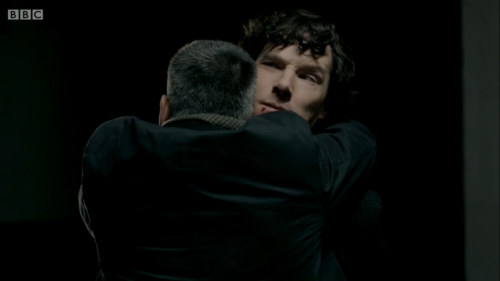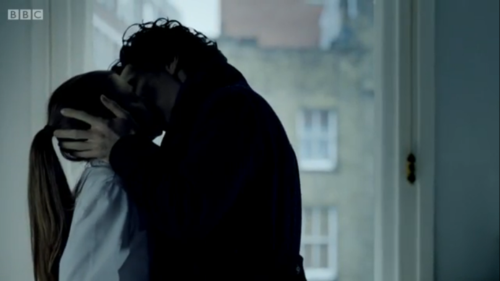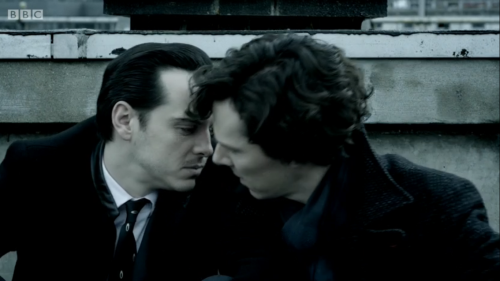I Love This A Lot.
I love this a lot.
But I'm having less of a problem with John's reactions - or lack thereof - then many people seem to be. And I've been wrestling with why.
...after here be spoilers...
John is a bit broken. As we all are. He's always been ashamed of it and of the crazy choices it makes him love: war, Sherlock, and now, Mary. He's an apologetic adrenaline junkie.
Why wasn't John more upset with Sherlock after he 'died'? Easy one. He understands that Sherlock was trying to protect him: It's what he'd do himself.
Why wasn't John more upset with Mary for lying to him? Still pretty easy. He is upset with her – he doesn’t seem to talk to her for a good long time. And he’s not more upset, in the end, because it is his fault, a bit. He wouldn't have chosen her if she wasn't a disaster that needed fixing. And everybody in the sitting room - all disasters needing fixing - knew that full well.
Now, the hard one. Why wasn't John more upset with Mary for shooting John? John is, at least on the surface, okay with Mary shooting Sherlock because he feels personally responsible. It is his job to keep Sherlock safe and he brought someone dangerous into Sherlock's safe zone. It isn't Mary's fault that she's dangerous - it's her wiring. It's John's fault for putting the two crazy choices together; one was going to hurt the other eventually. It was his job to keep them both safe and he let them hurt each other.
But with that said, while I do believe that John has forgiven Mary entirely for hurting him, I am not sold on the idea that John has forgiven Mary entirely for hurting Sherlock. And I think we’ll see that eventually.
People have been reblogging my John Watson post recently. And I can see why. I re-read it today and I was most struck by this line:
Sherlock may be an undeniable hurricane-strength force whirling through John’s life but John also chose him.
No, says Sherlock in HLV. John chose Mary. And...
More Posts from Perditorian and Others

I've been thinking this too, to my surprise.
I’m just warning you now, I think I’m going to explode with adoration and complete love for Amanda Abbington soon. From what I’ve seen from her so far, she already had my heart. Like, I’m probably going to favor her above all the cast.
I FEEL IT IN MY BONES.
I could get behind the idea of a Mr. Geoff Hooper.


Smoooooooth
Writing Advice: by Chuck Palahniuk In six seconds, you’ll hate me. But in six months, you’ll be a better writer. From this point forward—at least for the next half year—you may not use “thought” verbs. These include: Thinks, Knows, Understands, Realizes, Believes, Wants, Remembers, Imagines, Desires, and a hundred others you love to use. The list should also include: Loves and Hates. And it should include: Is and Has, but we’ll get to those later. Until some time around Christmas, you can’t write: Kenny wondered if Monica didn’t like him going out at night…” Instead, you’ll have to Un-pack that to something like: “The mornings after Kenny had stayed out, beyond the last bus, until he’d had to bum a ride or pay for a cab and got home to find Monica faking sleep, faking because she never slept that quiet, those mornings, she’d only put her own cup of coffee in the microwave. Never his.” Instead of characters knowing anything, you must now present the details that allow the reader to know them. Instead of a character wanting something, you must now describe the thing so that the reader wants it. Instead of saying: “Adam knew Gwen liked him.” You’ll have to say: “Between classes, Gwen had always leaned on his locker when he’d go to open it. She’s roll her eyes and shove off with one foot, leaving a black-heel mark on the painted metal, but she also left the smell of her perfume. The combination lock would still be warm from her butt. And the next break, Gwen would be leaned there, again.” In short, no more short-cuts. Only specific sensory detail: action, smell, taste, sound, and feeling. Typically, writers use these “thought” verbs at the beginning of a paragraph (In this form, you can call them “Thesis Statements” and I’ll rail against those, later). In a way, they state the intention of the paragraph. And what follows, illustrates them. For example: “Brenda knew she’d never make the deadline. was backed up from the bridge, past the first eight or nine exits. Her cell phone battery was dead. At home, the dogs would need to go out, or there would be a mess to clean up. Plus, she’d promised to water the plants for her neighbor…” Do you see how the opening “thesis statement” steals the thunder of what follows? Don’t do it. If nothing else, cut the opening sentence and place it after all the others. Better yet, transplant it and change it to: Brenda would never make the deadline. Thinking is abstract. Knowing and believing are intangible. Your story will always be stronger if you just show the physical actions and details of your characters and allow your reader to do the thinking and knowing. And loving and hating. Don’t tell your reader: “Lisa hated Tom.” Instead, make your case like a lawyer in court, detail by detail. Present each piece of evidence. For example: “During roll call, in the breath after the teacher said Tom’s name, in that moment before he could answer, right then, Lisa would whisper-shout ‘Butt Wipe,’ just as Tom was saying, ‘Here’.” One of the most-common mistakes that beginning writers make is leaving their characters alone. Writing, you may be alone. Reading, your audience may be alone. But your character should spend very, very little time alone. Because a solitary character starts thinking or worrying or wondering. For example: Waiting for the bus, Mark started to worry about how long the trip would take…” A better break-down might be: “The schedule said the bus would come by at noon, but Mark’s watch said it was already 11:57. You could see all the way down the road, as far as the Mall, and not see a bus. No doubt, the driver was parked at the turn-around, the far end of the line, taking a nap. The driver was kicked back, asleep, and Mark was going to be late. Or worse, the driver was drinking, and he’d pull up drunk and charge Mark seventy-five cents for death in a fiery traffic accident…” A character alone must lapse into fantasy or memory, but even then you can’t use “thought” verbs or any of their abstract relatives. Oh, and you can just forget about using the verbs forget and remember. No more transitions such as: “Wanda remembered how Nelson used to brush her hair.” Instead: “Back in their sophomore year, Nelson used to brush her hair with smooth, long strokes of his hand.” Again, Un-pack. Don’t take short-cuts. Better yet, get your character with another character, fast. Get them together and get the action started. Let their actions and words show their thoughts. You—stay out of their heads. And while you’re avoiding “thought” verbs, be very wary about using the bland verbs “is” and “have.” For example: “Ann’s eyes are blue.” “Ann has blue eyes.” Versus: “Ann coughed and waved one hand past her face, clearing the cigarette smoke from her eyes, blue eyes, before she smiled…” Instead of bland “is” and “has” statements, try burying your details of what a character has or is, in actions or gestures. At its most basic, this is showing your story instead of telling it. And forever after, once you’ve learned to Un-pack your characters, you’ll hate the lazy writer who settles for: “Jim sat beside the telephone, wondering why Amanda didn’t call.” Please. For now, hate me all you want, but don’t use thought verbs. After Christmas, go crazy, but I’d bet money you won’t. (…) For this month’s homework, pick through your writing and circle every “thought” verb. Then, find some way to eliminate it. Kill it by Un-packing it. Then, pick through some published fiction and do the same thing. Be ruthless. “Marty imagined fish, jumping in the moonlight…” “Nancy recalled the way the wine tasted…” “Larry knew he was a dead man…” Find them. After that, find a way to re-write them. Make them stronger.
Gorgeous and hard and so worth doing.
I like my writing advice like I like my men.
(rimshot)
Question: was it just the extra shots that John snuck in, or did Molly miscalculate for Sherlock on purpose in order to get them both hammered?

now that’s is a party i want to be a part of

Benedict Cumberbatch reading a letter by Alan Turing at the Letters Live event
I'm not sure if he's an actor so much as he's an utter chameleon.
-
 theonefixedpoint liked this · 2 years ago
theonefixedpoint liked this · 2 years ago -
 chriscalledmesweetie liked this · 8 years ago
chriscalledmesweetie liked this · 8 years ago -
 life-as-a-gummy-bear liked this · 8 years ago
life-as-a-gummy-bear liked this · 8 years ago -
 platinumkoi reblogged this · 9 years ago
platinumkoi reblogged this · 9 years ago -
 alexxphoenix42 reblogged this · 9 years ago
alexxphoenix42 reblogged this · 9 years ago -
 nukaone liked this · 9 years ago
nukaone liked this · 9 years ago -
 alexxphoenix42 liked this · 9 years ago
alexxphoenix42 liked this · 9 years ago -
 happierstill liked this · 9 years ago
happierstill liked this · 9 years ago -
 fictionophelia reblogged this · 9 years ago
fictionophelia reblogged this · 9 years ago -
 hudders-and-hiddles reblogged this · 9 years ago
hudders-and-hiddles reblogged this · 9 years ago -
 stillsupersherwholocked reblogged this · 9 years ago
stillsupersherwholocked reblogged this · 9 years ago -
 mellowmanatee reblogged this · 9 years ago
mellowmanatee reblogged this · 9 years ago -
 nieded reblogged this · 9 years ago
nieded reblogged this · 9 years ago -
 nieded liked this · 9 years ago
nieded liked this · 9 years ago -
 thatsmyotterteacozy liked this · 9 years ago
thatsmyotterteacozy liked this · 9 years ago -
 kate2kat reblogged this · 9 years ago
kate2kat reblogged this · 9 years ago -
 platinumkoi liked this · 9 years ago
platinumkoi liked this · 9 years ago -
 imagesymboltext liked this · 9 years ago
imagesymboltext liked this · 9 years ago -
 iwouldratherbeelsewhere liked this · 9 years ago
iwouldratherbeelsewhere liked this · 9 years ago -
 imminent-and-daring-escape reblogged this · 9 years ago
imminent-and-daring-escape reblogged this · 9 years ago -
 imminent-and-daring-escape liked this · 9 years ago
imminent-and-daring-escape liked this · 9 years ago -
 thechristmasrapture liked this · 9 years ago
thechristmasrapture liked this · 9 years ago -
 you-have-value liked this · 9 years ago
you-have-value liked this · 9 years ago -
 batik96 liked this · 9 years ago
batik96 liked this · 9 years ago -
 iwlyanmw reblogged this · 9 years ago
iwlyanmw reblogged this · 9 years ago -
 iwlyanmw liked this · 9 years ago
iwlyanmw liked this · 9 years ago -
 iwantthatbelstaffanditsoccupant liked this · 9 years ago
iwantthatbelstaffanditsoccupant liked this · 9 years ago -
 dixseptdixhuit liked this · 9 years ago
dixseptdixhuit liked this · 9 years ago -
 red-dreamer reblogged this · 9 years ago
red-dreamer reblogged this · 9 years ago -
 mycroftslittlebrother liked this · 9 years ago
mycroftslittlebrother liked this · 9 years ago -
 giroline liked this · 9 years ago
giroline liked this · 9 years ago -
 giroline reblogged this · 9 years ago
giroline reblogged this · 9 years ago -
 bagofthumbs liked this · 9 years ago
bagofthumbs liked this · 9 years ago -
 uma-has-it liked this · 9 years ago
uma-has-it liked this · 9 years ago -
 georgithegeorge liked this · 9 years ago
georgithegeorge liked this · 9 years ago -
 unreconstructedfangirl liked this · 9 years ago
unreconstructedfangirl liked this · 9 years ago -
 fiftysevvenacademics liked this · 9 years ago
fiftysevvenacademics liked this · 9 years ago -
 its-san-tastic liked this · 9 years ago
its-san-tastic liked this · 9 years ago -
 blue1836 liked this · 9 years ago
blue1836 liked this · 9 years ago -
 miadifferent reblogged this · 9 years ago
miadifferent reblogged this · 9 years ago











